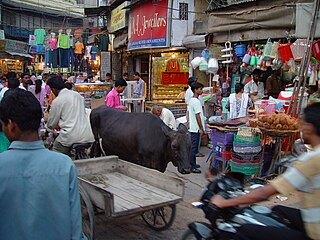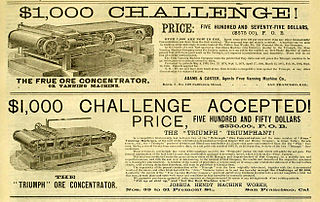
Microeconomics is a branch of economics that studies the behavior of individuals and firms in making decisions regarding the allocation of scarce resources and the interactions among these individuals and firms.
In economics, specifically general equilibrium theory, a perfect market, also known as an atomistic market, is defined by several idealizing conditions, collectively called perfect competition, or atomistic competition. In theoretical models where conditions of perfect competition hold, it has been demonstrated that a market will reach an equilibrium in which the quantity supplied for every product or service, including labor, equals the quantity demanded at the current price. This equilibrium would be a Pareto optimum.
In the social sciences, the free-rider problem is a type of market failure that occurs when those who benefit from resources, public goods, or services of a communal nature do not pay for them or under-pay. Free riders are a problem because while not paying for the good, they may continue to access or use it. Thus, the good may be under-produced, overused or degraded. Additionally, it has been shown that despite evidence that people tend to be cooperative by nature, the presence of free-riders cause this prosocial behaviour to deteriorate, perpetuating the free-rider problem.
Satisficing is a decision-making strategy or cognitive heuristic that entails searching through the available alternatives until an acceptability threshold is met. The term satisficing, a portmanteau of satisfy and suffice, was introduced by Herbert A. Simon in 1956, although the concept was first posited in his 1947 book Administrative Behavior. Simon used satisficing to explain the behavior of decision makers under circumstances in which an optimal solution cannot be determined. He maintained that many natural problems are characterized by computational intractability or a lack of information, both of which preclude the use of mathematical optimization procedures. He observed in his Nobel Prize in Economics speech that "decision makers can satisfice either by finding optimum solutions for a simplified world, or by finding satisfactory solutions for a more realistic world. Neither approach, in general, dominates the other, and both have continued to co-exist in the world of management science".

Conspicuous consumption is a term used to describe and explain the consumer practice of purchasing or using goods of a higher quality or in greater quantity than might be considered necessary in practical terms. More specifically, it refers to the spending of money on or the acquiring of luxury goods and services in order to publically display the economic power of one's income or accumulated wealth. To the conspicuous consumer, such a public display of discretionary economic power is a means of either attaining or maintaining a given social status.
The theory of consumer choice is the branch of microeconomics that relates preferences to consumption expenditures and to consumer demand curves. It analyzes how consumers maximize the desirability of their consumption as measured by their preferences subject to limitations on their expenditures, by maximizing utility subject to a consumer budget constraint.
Welfare economics is a branch of economics that uses microeconomic techniques to evaluate well-being (welfare) at the aggregate (economy-wide) level.
Consumer sovereignty is an economic concept where the consumer has some controlling power over goods that are produced, and the idea that the consumer is the best judge of their own welfare.

Club goods are a type of good in economics, sometimes classified as a subtype of public goods that are excludable but non-rivalrous, at least until reaching a point where congestion occurs. Often these goods exhibit high excludability, but at the same time low rivalry in consumption. Thus, club goods have essentially zero marginal costs and are generally provided by what is commonly known as natural monopolies. Furthermore, Club goods have artificial scarcity. Club theory is the area of economics that studies these goods. One of the most famous provisions was published by Buchanan in 1965 "An Economic Theory of Clubs," in which he addresses the question of how the size of the group influences the voluntary provision of a public good and more fundamentally provides a theoretical structure of communal or collective ownership-consumption arrangements.

Exit, Voice, and Loyalty (1970) is a treatise written by Albert O. Hirschman (1915–2012). The work hinges on a conceptual ultimatum that confronts consumers in the face of deteriorating quality of goods: either exit or voice. The book has been described as influential. The framework presented in the book has been applied to topics such as protest movements, migration, political parties, and interest groups, as well as to personal relationships.
The Tiebout model, also known as Tiebout sorting, Tiebout migration, or Tiebout hypothesis, is a positive political theory model first described by economist Charles Tiebout in his article "A Pure Theory of Local Expenditures" (1956). The essence of the model is that there is in fact a non-political solution to the free rider problem in local governance. Specifically, competition across local jurisdictions places competitive pressures on the provision of local public goods such that these local governments are able to provide the optimal level of public goods.

Sir Julian Ernest Michael Le Grand, FBA is a British academic specialising in public policy. He is the Richard Titmuss Professor of Social Policy at the London School of Economics (LSE) and was a senior policy advisor to former Prime Minister Tony Blair.

In economics, competition is a scenario where different economic firms are in contention to obtain goods that are limited by varying the elements of the marketing mix: price, product, promotion and place. In classical economic thought, competition causes commercial firms to develop new products, services and technologies, which would give consumers greater selection and better products. The greater the selection of a good is in the market, prices are typically lower for the products, compared to what the price would be if there was no competition (monopoly) or little competition (oligopoly). This is because there is now no rivalry between firms to obtain the product as there is enough for everyone. The level of competition that exists within the market is dependant on a variety of factors both on the firm/ seller side; the number of firms, barriers to entry, information availability, availability/ accessibility of resources. The number of buyers within the market also factors into competition with each buyer having a willingness to pay, influencing overall demand for the product in the market.
Public economics is the study of government policy through the lens of economic efficiency and equity. Public economics builds on the theory of welfare economics and is ultimately used as a tool to improve social welfare.
The hypothecation of a tax is the dedication of the revenue from a specific tax for a particular expenditure purpose. This approach differs from the classical method according to which all government spending is done from a consolidated fund.
In public choice theory, tax choice is the belief that individual taxpayers should have direct control over how their taxes are spent. Its proponents apply the theory of consumer choice to public finance. They claim taxpayers react positively when they are allowed to allocate portions of their taxes to specific spending.
The benefit principle is a concept in the theory of taxation from public finance. It bases taxes to pay for public-goods expenditures on a politically-revealed willingness to pay for benefits received. The principle is sometimes likened to the function of prices in allocating private goods. In its use for assessing the efficiency of taxes and appraising fiscal policy, the benefit approach was initially developed by Knut Wicksell (1896) and Erik Lindahl (1919), two economists of the Stockholm School. Wicksell's near-unanimity formulation of the principle was premised on a just income distribution. The approach was extended in the work of Paul Samuelson, Richard Musgrave, and others. It has also been applied to such subjects as tax progressivity, corporation taxes, and taxes on property or wealth. The unanimity-rule aspect of Wicksell's approach in linking taxes and expenditures is cited as a point of departure for the study of constitutional economics in the work of James Buchanan.

Motivation, Agency, and Public Policy is a non-fiction book written by the economist Julian Le Grand. The book, which argues in favor of increasing tax choice, was described by The Economist as "accessible – and profound" and by The Times as "one of the most stimulating books on public policy in recent years".
The concept of a merit good introduced in economics by Richard Musgrave is a commodity which is judged that an individual or society should have on the basis of some concept of need, rather than ability and willingness to pay. The term is, perhaps, less often used today than it was in the 1960s to 1980s but the concept still lies behind many economic actions by governments which are not performed specifically for financial reasons or by supporting incomes. Examples include in-kind transfers such as the provision of food stamps to support nutrition, the delivery of health services to improve quality of life and reduce morbidity, subsidized housing and education.
Katherine Cuff is a Canadian economist who currently serves as Professor of Economics at McMaster University. She holds the Canada Research Chair in Public Economic Theory and has been recognized as a McMaster University Scholar. Cuff also serves as Managing Editor of the Canadian Journal of Economics and editor of the Finanzarchiv.







